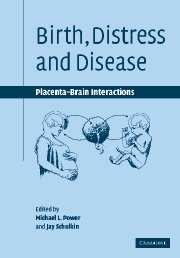Book contents
- Frontmatter
- Contents
- List of contributors
- Preface
- Introduction: brain and placenta, birth and behavior, health and disease
- 1 Placental expression of neurohormones and other neuroactive molecules in human pregnancy
- 2 The regulation of human parturition
- 3 Maternal nutrition and metabolic control of pregnancy
- 4 Fetal HPA activation, preterm birth and postnatal programming
- 5 Prenatal glucocorticoids and the programming of adult disease
- 6 Prenatal stress and stress physiology influences human fetal and infant development
- 7 Glucocorticoids and the ups and downs of neuropeptide gene expression
- 8 Glucocorticoid facilitation of corticotropin-releasing hormone in the placenta and the brain: functional impact on birth and behavior
- Index
6 - Prenatal stress and stress physiology influences human fetal and infant development
Published online by Cambridge University Press: 16 October 2009
- Frontmatter
- Contents
- List of contributors
- Preface
- Introduction: brain and placenta, birth and behavior, health and disease
- 1 Placental expression of neurohormones and other neuroactive molecules in human pregnancy
- 2 The regulation of human parturition
- 3 Maternal nutrition and metabolic control of pregnancy
- 4 Fetal HPA activation, preterm birth and postnatal programming
- 5 Prenatal glucocorticoids and the programming of adult disease
- 6 Prenatal stress and stress physiology influences human fetal and infant development
- 7 Glucocorticoids and the ups and downs of neuropeptide gene expression
- 8 Glucocorticoid facilitation of corticotropin-releasing hormone in the placenta and the brain: functional impact on birth and behavior
- Index
Summary
Prenatal stress has been proposed as a risk factor that may have developmental consequences persisting throughout the lifespan. Exposing rodents to stress during pregnancy has consequences for brain development, stress regulation, learning, emotionality (increased anxiety), and social behavior (increased withdrawal) of the offspring (Weinstock, 2001; Chapillon et al., 2002). Additionally, non-human primates who experience stress during pregnancy have offspring with enhanced behavioral reactivity to stressors later in life (Clarke et al., 1994), lowered levels of motor behavior (Schneider, 1992), compromised neuromotor responses (Schneider and Coe, 1993), irritable temperament (Schneider et al., 1992), and attentional problems (Schneider et al., 1999).
Many researchers have focused on the hypothalamic—pituitary—adrenocortical (HPA) axis, one of the body's major stress systems, as a mechanism that may mediate these effects (Ward and Phillips, 2001; Welberg and Seckl, 2001). The HPA axis activity is regulated by the release of hypothalamic corticotropin-releasing hormone (CRH) that stimulates the biosynthesis and release of adrenocorticotropin hormone (ACTH) and β-endorphin (βE) from the anterior pituitary. The release of ACTH triggers the biosynthesis and release of glucocorticoids (cortisol in primates and corticosterone in rodents) from the adrenal cortex. Glucocorticoids are released into the general circulation and have effects on nearly every organ and tissue in the body (Munck et al., 1984).
- Type
- Chapter
- Information
- Birth, Distress and DiseasePlacental-Brain Interactions, pp. 183 - 201Publisher: Cambridge University PressPrint publication year: 2005
- 2
- Cited by



